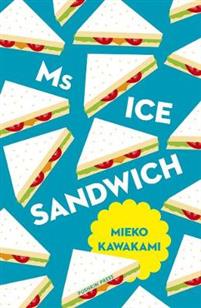Ms Ice Sandwich by Mieko Kawakami
 Monday, December 4, 2017 at 8:02AM
Monday, December 4, 2017 at 8:02AM 
First published in Japan in 2013 (in a literary journal) and in 2014 (as part of a novel); published in translation by Pushkin Press on January 23, 2018
Ms. Ice Sandwich is the name bestowed upon a sandwich seller with large eyes and a damaged face by the novel’s young narrator. The narrator is fascinated by Ms. Ice Sandwich; he has a crush or the first experience of love from afar. He sketches her endlessly but never speaks to her except to order a sandwich.
Other kids, and some adults, view Ms. Ice Sandwich as a monster or a freak. She is apparently a victim of surgical malpractice, but whatever the cause of her unusual appearance, the young narrator feels saddened by the meanness that surrounds her. At the same time, when other kids question his obsession with the woman, he stops seeing her, a solution that saddens him until his new friend Tutti gives him some worldly advice that she figured out in the first grade. I won’t spoil the advice, but it is the kind of wisdom that is easily forgotten and from which everyone would benefit.
The novella offers the narrator’s amusing insights into his fourth-grade life as he reacts to a world he is trying to comprehend. His grandmother is dying. He isn’t sure what to make of concepts like aging and death. Girls and adults are mysterious, but Ms. Ice Sandwich is the most mysterious of all.
The story is obviously about growing up, but it is also about friendship. The narrator’s blossoming friendship with Tutti contrasts with the infatuation he feels for Ms. Ice Sandwich. Part of growing up is learning the value of genuine friendship, as is learning that physical appearance is not the standard that should be used to select friends — a lesson that comes late in life to many, if it comes at all.
Ms Ice Sandwich brilliantly captures the wonder and puzzlement of childhood, the burning desire to figure things out and the sense of loss when reality replaces imagination. Learning to say goodbye and coping with loss, real and imagined, is another important part of growing up, one that Mieko Kawakami illustrates in a variety of contexts. But for every loss there is a gain; for every goodbye, there is a hello. That’s another lesson that comes as we experience life, and one that the narrator’s experience will eventually cause him to recognize.
Ms Ice Sandwich is a story of emotions and feelings more than events. The novel’s limitations are also its strengths. The novella uses no more words than it needs. It does not pretend to be epic. Its focus is narrow, but the small world that the narrator inhabits is rich with the kind of details that children notice and that adults take for granted, like the sensation of falling snowflakes. The story is small but the novella’s lessons are large. That’s quite an achievement.
RECOMMENDED